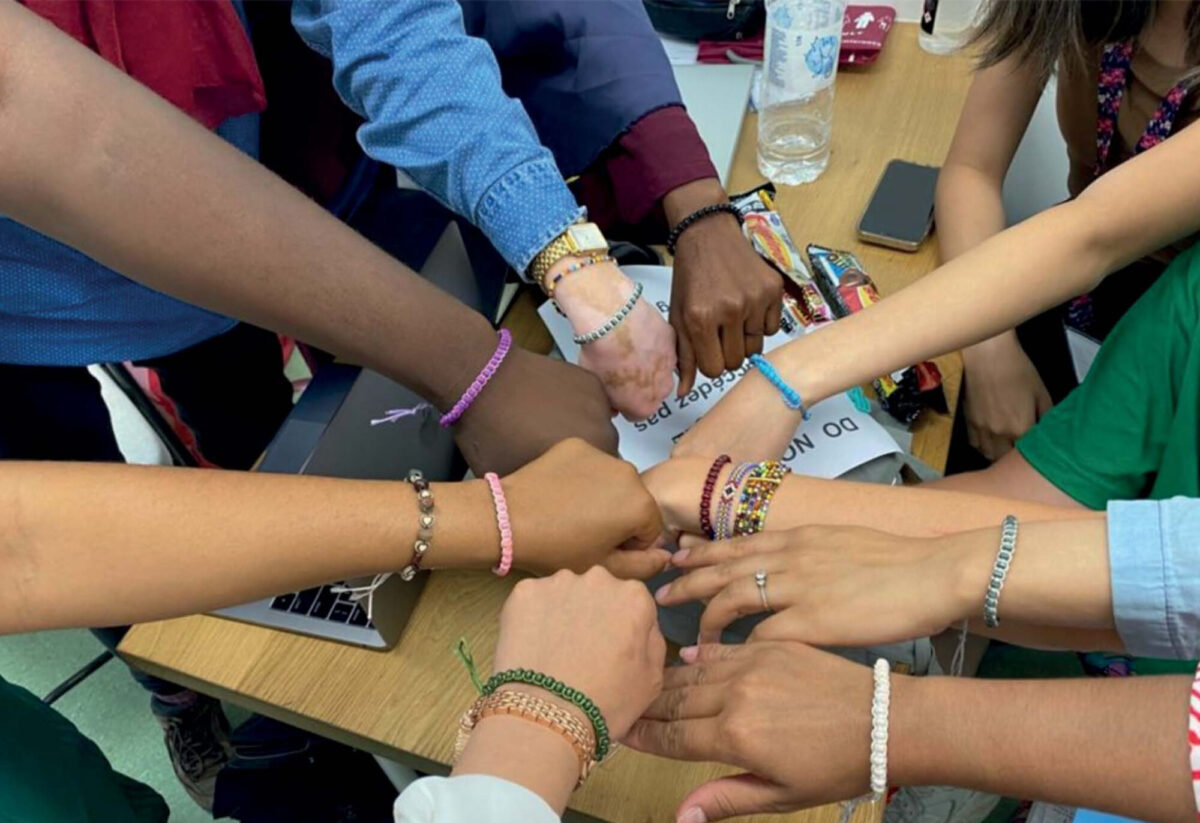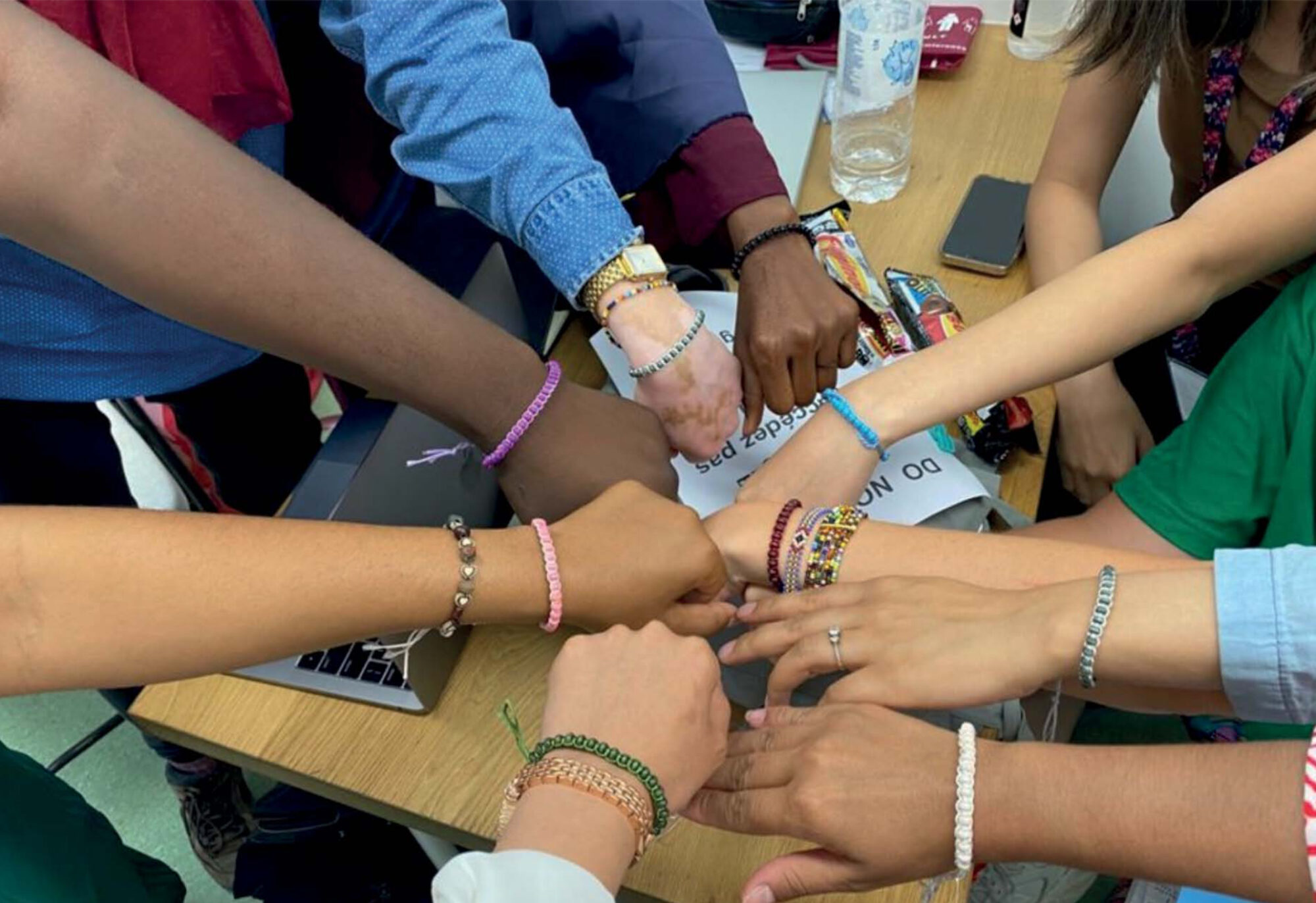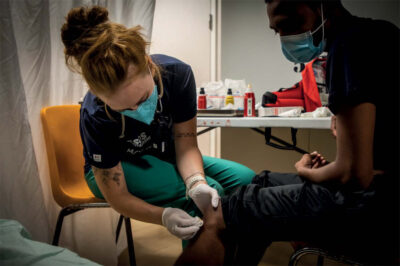Main content
Involving refugees in research about their own healthcare remains rare, despite growing calls for meaningful participation. While patient and community groups are increasingly involved in shaping their own health, refugees are often excluded and tokenised.[2,3] A review of 53 WHO (World Health Organisation) European Region member states found that refugees and migrants are seldom co-producers of evidence regarding their health.[4] Yet, their participation is critical, not just for the credibility and relevance of the research and for ensuring that healthcare systems address their unique needs, but also in fostering empowerment and agency.[5,6]
Participatory Action Research (PAR) offers a solution to this gap. Rooted in anticolonial and emancipatory traditions, PAR actively involves those whose lives are the focus of research in the entire process of knowledge generation with the explicit aim of effecting positive social change.[7] Rather than ‘research on’ refugees, PAR fosters ‘research with’ refugees, challenging the top-down approaches of traditional methodologies and dismantling harmful power dynamics that often mirror colonial hierarchies.[8]
In the summer of 2023, our team embarked on a PAR project focused on the sexual and reproductive health of refugee women on Lesbos. Our research team included ten refugee co-researchers representing key ethnic groups from the refugee camp. Co-researchers typically had similar lived experiences and shared the same cultural and linguistic backgrounds as the research participants. They were recruited, trained and paid as collaborators and participated in every step of the research, from formulating the research questions and developing the data collection tools to recruitment, data collection, analysis and dissemination of the findings.
This collaborative process proved instrumental for the quantity and quality of our data. Moreover, it was transformative for everyone involved. For team members from western universities, it challenged preconceived notions about the refugee experience and prompted a re-evaluation of our approach to cross-cultural collaborations. Co-researchers acquired new technical skills and felt genuinely valued, which bolstered their confidence to pursue future opportunities. Meanwhile, for the refugee community, witnessing their fellow camp residents take on roles of responsibility instilled a sense of pride and reinforced the importance of their contributions. Additionally, the friendships and bonds formed throughout the project cultivated a strong sense of support and community that continues to thrive beyond the research.

Based on our experiences, we have compiled a list of practical considerations for researchers seeking to engage refugees meaningfully in healthcare research. While these insights stem from our particular project, we believe they hold broader relevance. We are not oblivious to the challenges that come with meaningful participation (e.g.: power dynamics, time constraints, elite involvement etc.), nor naïve to our own limitations, but remain passionate advocates of the approach. We offer these tips with humility, acknowledging that every research context is unique, and that flexibility, openness, and a commitment to continuous learning are essential to the success of PAR.
1. Establish early communication
Create an informal network before fieldwork starts to initiate conversations and build relationships. This sets a collaborative tone from the beginning. Three months prior to meeting each other for the first time, our team had been in touch via a WhatsApp group and was ready to dive into the challenges of the fieldwork. Now that our data collection is over, and we are dispersed over the world, we still remain in touch digitally.
2. Trust counterintuitive advice
During consultations with the refugee community prior to recruitment, we were advised to include a male co-researcher in the team, despite our focus on women’s health. Initially, we dismissed this suggestion, but after having it reiterated from others, we decided to trust their judgement. It proved invaluable and was crucial advice, actually enhancing access to this particular community.
3. Co-create a working agreement
Discuss expectations, hopes, and fears at the onset. This ensures alignment and clarity on roles, responsibilities, and shared values. At the start of our project, we spent considerable time co-creating our working agreement. This process helped us avoid misunderstandings later on and built a foundation of mutual respect and shared goals.
4. Respect reimbursement discussions
Discuss compensation openly, considering hourly rates, net salary, and differences in involvement and workload. We openly deliberated on payment structures and revisited this once it became clear that some of the co-researchers were responsible for larger study samples than others. We then honoured the team’s suggestion to recruit an extra member.
5. Prioritise relationships
Spend time together outside formal research settings and invest in relationships. Personal moments—as simple as eating ice cream, celebrating birthdays, or visiting each other when sick—help build emotional connections and strengthen the team. Reflecting back on our field work, these memories were by far the most valuable and instrumental in building trust.
6. Provide transportation
Swallow your pride and do not get frustrated when you feel like a taxi-driver as opposed to a project lead. Flexibility in transport helps keep momentum when local infrastructure is unreliable. More importantly, driving the team to and from the refugee camp not only removed hierarchies but also created space for insightful conversations. For example, it was during such a trip that one of the co-researchers admitted that the day’s training session on gender-based violence had made her lose trust in the project and that she considered resigning. This open feedback – which had not been shared at the debriefing – allowed us to address her concerns as well as those of the other team members the following day. We then co-created and implemented appropriate mitigation strategies.
7. Act on feedback
Continuously seek feedback and ensure that co-researchers have a real say in decision-making processes. This can help avoid tokenistic participation and foster a sense of ownership. In our project, we respected suggestions to the best of our abilities, whether related to content (which topics and questions are to be included in the questionnaire and in which order?), logistics (where and when should we conduct interviews?), reimbursement (should we financially compensate participants and if so, how much?), or dissemination (what are the main outcomes we want to present to the camp manager?).
8. Share resources and responsibilities
Equip your team with the material they require to perform their work. Trust co-researchers with (sometimes expensive) devices, just like you would in any other context. In our project, the ‘research bag’ (including keys to our office and interview rooms, the communal research phone, and internet router) was not kept in the possession of the project lead alone, improving logistics and fostering accountability among co-researchers. Having said that, take concerns about safety seriously and provide lockers/safe places if this is deemed necessary. In our case, for instance, some of the co-researchers were not comfortable keeping laptops in their tents due to the risk of theft.
9. Hold your team to the same standards
Treat all team members equally, regardless of their background or circumstances. In our project, we ensured that everyone was held to the same professional standards and expectations, avoiding the risk of victimising or infantilising the co-researchers. By avoiding assumptions about their trauma or cultural background, we steered clear of patronising, romanticising, or stereotyping. This meant that co-researchers felt valued for the unique individuals they were and empowered in their professional roles.
10. Avoid assumptions about refugees’ time and commitments
Refugees lead complex and busy lives. Be respectful and sensitive to their time, particularly in camp environments with rigid schedules, such as food lines and asylum appointments. One of our co-researchers missed crucial food distribution slots due to the timing of training sessions, a misstep that made us realise we had not tried to fully understand the daily realities of our team. We quickly revised our schedule to ensure that no one’s essential needs or other commitments were compromised.
11. Be sensitive to the impacts of the asylum process
Camp life comes with many external stressors—like poor living conditions, legal uncertainty, and social isolation. One co-researcher was unexpectedly transferred to mainland Greece, while another was forcibly removed from her tent. A third had to suddenly share her accommodation with newcomers. These events placed significant strain on the individual co-researchers as well as the team and reminded us to remain agile and supportive.
12. Acknowledge the importance of tangible tokens
In our project, we were initially sceptical about the team’s request for visibility. However, we soon realised that co-researchers often faced access restrictions, whereas the team members with western passports could move freely in and out of the camp. We addressed this by providing badges that clearly displayed their research roles, enhancing their authority and helping them navigate the system more effectively. It was a seemingly small but impactful solution that ensured they were respected in their roles.
13. Avoid relying on co-researchers’ personal resources
Refugees lead complex and busy lives. Be respectful and sensitive to their time, particularly in camp environments with rigid schedules, such as food lines and asylum appointments. One of our co-researchers missed crucial food distribution slots due to the timing of training sessions, a misstep that made us realise we had not tried to fully understand the daily realities of our team. We quickly revised our schedule to ensure that no one’s essential needs or other commitments were compromised.
14. Embrace conflict
Conflict can be a powerful tool for growth. When disagreements arose, we viewed them as opportunities to better understand each other’s perspectives. For example, a heated debate around how to approach gender-based violence led to a more thoughtful and respectful methodology. Addressing conflict head-on ultimately strengthened our collaboration.
15. Invest in training beyond research tasks
While technical training and skills development (such as data entry, interview techniques, research ethics, etc) are essential for ensuring high-quality research, investing in co-researchers beyond the scope of the project ensures that they benefit beyond the immediate research goals. By offering personal mentoring and CV building, we aimed to invest in individuals so they could not only contribute to the research but also navigate their own professional futures with a (renewed) sense of agency and purpose.
16. Remember mental health
The emotional toll of this work can be profound, particularly when confronted with accounts of discrimination, traumatic childbirths, drowned children, rape, physical assault, and the constant anxiety surrounding asylum procedures. Prioritising the team’s mental well-being is essential to prevent burnout and sustain morale. In our project, we recognized the need for regular mental health support early on, implementing daily debriefs, routine check-ins, and group therapy sessions to help the team process difficult experiences.
17. Continue to stay in touch
Maintain the connections you have built among your research group and with external stakeholders, and use this as an opportunity to forge new initiatives and projects. In the case of our research project, we held two separate workshops in Athens and Lesvos in 2024 to co-create actionable solutions based on our research findings. Co-researchers who moved on from Lesbos to other parts of the world documented their daily lives and the impact it has on their health through photovoice, which we have exhibited at four conferences so far.
18. Honour follow-up plans
Commit to the solutions you co-create. One of our co-researchers expressed disappointment that the actionable recommendations from our research had not been implemented fast enough. This experience reinforced the importance of staying dedicated to follow-up actions, ensuring that the work does not end when data collection does.
Finally, we advise you (tongue-in-cheek) to disregard the above considerations and encourage you and your team to craft your own set of guidelines. While theoretical training and learning from others are important, PAR thrives on democratic principles and requires forging new paths. To challenge entrenched power structures that marginalise communities, it is essential to experiment with innovative, creative approaches. Be bold – avoid falling back on protocols from the old guard – and remember that PAR was not meant to complement existing ways; it is a tool for disruption.
For more information: https://vu.nl/en/about-vu/research-institutes/athena-institute/more-about/venturing-beyond-emergency-care-participatory-action-research-on-the-sexual-and-reproductive-health-of-refugee-women-on-lesbos (including the preliminary results of our research).
References
- MacFarlane A, Huschke S, Marques MJ, Gama A, Kinaan W, Hassan A, et al. Normalising participatory health research approaches in the WHO European region for refugee and migrant health: a paradigm shift. (2666-7762 (Electronic)).
- van den Muijsenbergh M, Teunissen E, van Weel-Baumgarten E, van Weel C. Giving voice to the voiceless: how to involve vulnerable migrants in healthcare research. British Journal of General Practice. 2016;66(647):284-5.
- Abma T BS, Cook T, Dias S, Madsen W, Springett J et al. Participatory research for health and social wellbeing. C, editor2019.
- MacFarlane AA-O, Ogoro MA-O, de Freitas CA-O, Niranjan VA-O, Severoni S, Waagensen EA-O. Migrants’ involvement in health policy, service development and research in the WHO European Region: A narrative review of policy and practice. (1365-3156 (Electronic)).
- O’Reilly-de Brún M, de Brún T, Okonkwo E, Bonsenge-Bokanga J-S, De Almeida Silva MM, Ogbebor F, et al. Using Participatory Learning & Action research to access and engage with ‘hard to reach’ migrants in primary healthcare research. BMC Health Services Research. 2016;16(1):25.
- Europe WROF. Participatory health research with migrants: a country implementation guide.. Copenhagen; 2022. Contract No.: Licence: CC BY-NC-SA 3.0 IGO.
- Position paper 1: what is participatory health research?. Berlin: International Collaboration for Participatory Health Research; 2013.
- Omodan B, Dastile N. Analysis of Participatory Action Research as a Decolonial Research Methodology. Social Sciences. 2023;12:507.



















































